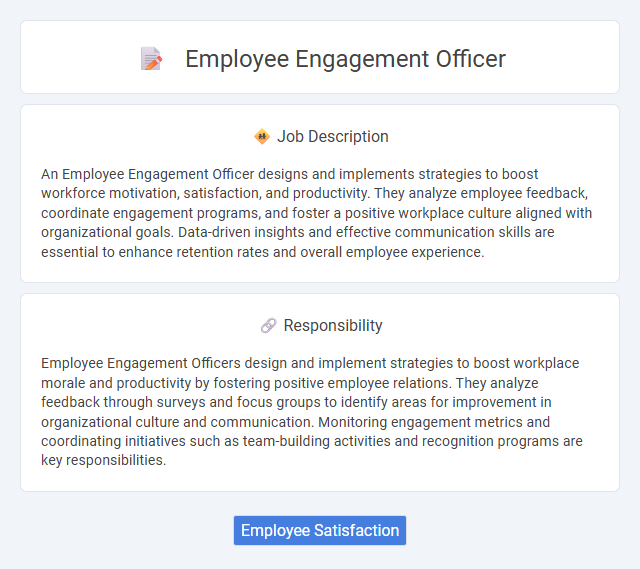
An Employee Engagement Officer designs and implements strategies to boost workforce motivation, satisfaction, and productivity. They analyze employee feedback, coordinate engagement programs, and foster a positive workplace culture aligned with organizational goals. Data-driven insights and effective communication skills are essential to enhance retention rates and overall employee experience.
Individuals with strong interpersonal skills and a genuine interest in fostering positive workplace relationships are likely to thrive as Employee Engagement Officers. Those who are empathetic, proactive, and enjoy facilitating communication between management and staff may find this role particularly suitable. Candidates who prefer collaborative environments and are motivated by improving employee satisfaction probably align well with the responsibilities of this position.
Qualification
An Employee Engagement Officer typically requires a bachelor's degree in Human Resources, Organizational Psychology, or Business Administration. Key qualifications include strong communication skills, experience in employee relations, and proficiency in designing and implementing engagement programs. Certifications such as SHRM-CP or CIPD enhance credibility and demonstrate expertise in workforce motivation and retention strategies.
Responsibility
Employee Engagement Officers design and implement strategies to boost workplace morale and productivity by fostering positive employee relations. They analyze feedback through surveys and focus groups to identify areas for improvement in organizational culture and communication. Monitoring engagement metrics and coordinating initiatives such as team-building activities and recognition programs are key responsibilities.
Benefit
An Employee Engagement Officer likely enhances workplace morale and productivity by developing initiatives that foster a positive company culture. Improved employee satisfaction may contribute to reduced turnover rates and increased loyalty, benefiting overall business performance. Companies probably see a return on investment through higher engagement, which can lead to better collaboration and innovation.
Challenge
Employee Engagement Officers likely face the challenge of balancing diverse employee needs while fostering a cohesive and motivated workplace culture. Navigating resistance to change and maintaining high levels of participation in engagement initiatives may require strategic communication and adaptability. Success in this role probably depends on continuous innovation to keep engagement efforts relevant and impactful.
Career Advancement
Employee Engagement Officers play a critical role in enhancing workplace culture and boosting employee satisfaction, directly contributing to organizational success. Gaining expertise in employee relations, communication strategies, and performance metrics opens pathways to senior human resources roles, such as HR Manager or Talent Development Specialist. Continuous professional development and certifications in organizational psychology or HR management significantly accelerate career growth within the employee engagement domain.
Key Terms
Employee Satisfaction
Employee Engagement Officers play a crucial role in enhancing employee satisfaction by designing and implementing programs that foster a positive work environment and promote open communication. They analyze employee feedback using surveys and performance metrics to identify areas for improvement and develop targeted strategies that increase motivation and retention. By aligning organizational goals with employee needs, these officers drive higher productivity and create a culture of trust and recognition.
 kuljobs.com
kuljobs.com